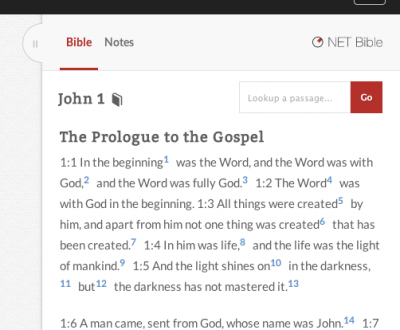Updates are a Good Thing
Developing a Bible translation during the age of the internet allows us to do some things that were not possible previously. For example, the fact that electronic copies of texts are much more malleable caused us to think of the NET Bible not really as a fixed text but a changing one. Let me explain what I mean by discussing this from a “business” standpoint. Now I will be the first to remind you that we do not think of Bible.org as a business or of the NET Bible as a product. Bible.org is a ministry, and the NET Bible is a translation of the Scriptures, but this “business” viewpoint will enable me to make a point which sets the NET Bible apart from other translations.
Publishing is like any other business in that a company puts capital and energy into creating a product which it then markets and sells to customers. Think of everything that goes into a book before you buy it: The author takes time and energy to write it. The publisher takes materials, resources, time, and energy to create the physical book. This is then marketed to the customer through various means, all of which take time and money. Bible translations are really no different. Scholars expend time and energy to translate the Word, then the publisher creates the physical book which is then sold to the Bible reader.
The problems arise when changes need to be made to the text of the book. Once a publisher commits to a print run, it is very costly to do anything but sell those printed books. We have all read books that have typos, misprints, and other problems in them. (The printed NET Bible is no different. We have found some pretty funny stuff along the way. Perhaps I should post about some of our more interesting finds at some point!) Unfortunately at this point the publisher has to sell off those copies before more copies can be made. They have to recover their costs in order to move forward and print a corrected copy. Sometimes changes occur in which necessitate a new version of a book, not because of an error but because of new information or a new situation. For whatever reason, books oftentimes need to be updated (that’s why certain texts are issued in various editions), and that can be a costly process.
More to the point of Bible translation, biblical scholarship continues to advance, and the English language itself continues to evolve. There are words in English now that did not exist twenty years ago, and we’ll say the same thing again in twenty more years. Biblical scholarship is a living discipline with many exciting developments. All of this means that any translation which sets out to be static by default will be outdated in a short period of time.
The NET Bible was originally conceived as a Bible which could be readily updated at a minimal cost. We focus on internet distribution and small print runs so that we can at the appropriate time publish new, updated editions which reflect contemporary English language and biblical scholarship. We want the NET Bible to speak continually to every generation, and this flexibility helps us achieve that goal.


3 Comments
Richard
so what does this mean for the future of NET?
So does this mean that the NET will be updated electronically (Bibleworks, Logos, web), but not in print? Or is a new print version in the works (without all the “kai has not be translated for style reasons” notes)? Or is this an explanation as to why a new print version of the NET is not forthcoming?
Thanks,
Richard
Michael Burer
You can see some more info
You can see some more info on that topic here:
Bruce Russell
Romans 3:28
We have been studying the history of translating Romans 3:28 an notice that the NET as well as all historical translations have not rendered ???????? ????? ????? ????? according to expected Greek grammar.
See blog post below…
http://ntexegesis.blogspot.com/2010/04/in-romans-328.html
Has anyone on the NET team noticed this?
Could I actually ask the people connected with the NET translation team about this?
Bruce Russell